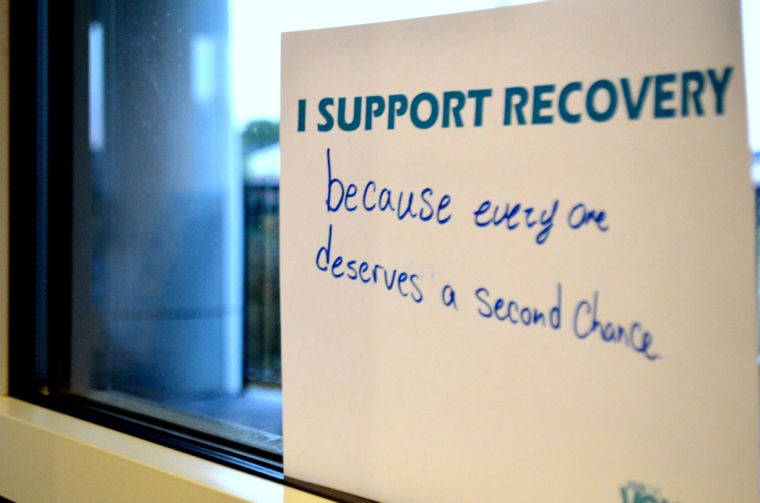“Voices of Recovery” shows different sides of substance abuse
UNCW students filled out signs and posted them on the windows of the Clocktower Lounge for the Voices of Recovery event.
UNCW’s substance abuse prevention and education program, Crossroads, hosted its third annual “Voices of Recovery” program which gave students a chance to share their personal stories of healing.
About four to six percent of UNCW students described themselves as living in recovery according to Rebecca Caldwell, director of Crossroads.
“Recovery is when people realize they have an unhealthy relationship or physical addiction to some kind of substance, and they are on the road to a happier and healthier life,” said Caldwell.
In 2011, an estimated 22.5 million Americans 12 and older, used illicit drugs, marijuana being the most common according to the National Survey on Drug Use and Health. Almost a quarter of the 22.5 million Americans using drugs were full time college students.
The survey found 51.8 percent of Americans within the same age range drank alcohol.
Kyleen Armstrong, a senior and peer educator at Crossroads who helped plan the Sept. 25 “Voices of Recovery,” spoke first at the event.
“‘Voices of Recovery’ is an opportunity to hear other people who might have gone through something you’re starting to go through,” said Armstrong.
Armstrong became involved with Crossroads during her sophomore year at UNCW. Although it wasn’t evident to her at first, her motivation to join came from family issues with substance abuse.
“I have so far been blessed to sidestep the disease that is addiction,” said Armstrong. “I am the second youngest in a family of seven kids. The addicts in my family are all four of my brothers.”
Armstrong helps program events on campus to facilitate education about alcohol and drug abuse.
Senior Dan Faulkenberry also spoke, and he stressed that addiction is not a choice but a disease. He said that an addict is not a bad person because of his actions. Faulkenberry’s dry sense of humor and brutal honesty made him relatable to the audience.
“People say there is a time and place for everything, and that’s college,” said Faulkenberry. “I took that to town.”
Faulkenberry emphasized that drugs and alcohol were not what life was about.
“Living makes life what it is,” said Faulkenberry.
Sara Nunnally, a senior and program planner at Crossroads, was the last speaker of the night and shared her experiences with alcoholism and an eating disorder, which eventually landed her in the dean’s office during her sophomore year. Nunnally, whose voice often broke with emotion, spoke without notes, and her gaze engulfed the room.
“My addiction-an eating disorder is considered an addiction-intertwined with my use of alcohol,” said Nunnally. “It was just a really nasty cycle.”
In high school, Nunnally’s parents shielded her from drinking as much as they could. However, like most parents, they were forced to relinquish control when Nunnally left for college.
“When I went to college, I wanted to do whatever I wanted,” said Nunnally. “I wanted to be a rebel. I knew I wanted to abuse substances, to ‘party hard.'”
Nunnally drank excessively in college, often waking up in the morning wondering why she was not dead.
“I drank a lot, and it got me into trouble,” said Nunnally.
Nunnally later recalled that she was lucky enough to have friends to notice her downward spiral and turn her in to the dean’s office, where she was asked to get help for her addictions before she could return to UNCW.
Despite the differences in each speaker’s story, all said that the most important aspect of their recovery was not getting treatment but a strong support network.
“I have chosen a recovery method that has introduced me to a lot of sober people and a great support system,” said Nunnally. “That’s really what it’s all about is finding that support.”









